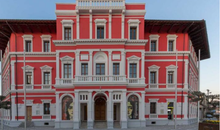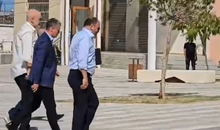
 Flash News
Flash News

Alfred Lela
The Catholic Church in Albania presented a few days ago a Resolution condemning the crimes and images of communism. While the debate is old, so is the conflict between the Church and Albanian Communism.
It must be understood that the Resolution is not new revenge for old blood, and it must be asked if the threat of communist crimes and images is present in the political and social culture of Albania. The very existence of the debate proves that, YES.
The fact that the clash of civilizations continues shows that resistance to the communist legacy has been incomplete and refractory. By refractory, we mean an affront of this heritage only by one political-ideological wing or only by a part of society.
This happened for several reasons, and almost all of them have to do with the elites of Tirana. Converted into anti-communists overnight, they faced two almost insurmountable difficulties: to fight their heritage and that of the families they came from or, in the political case, to damage electoral prospects in front of a people that, for about 40 years, was framed in a mindset where surrender and brainwashing were combined. Accustomed to the patron and guardian state, a tumultuous population found it difficult to act in conditions of freedom.
The most significant damage in dealing with this legacy was done by the leftist elites who could not accept that their literature, historiography, linguistics, cinematography, a work of four decades, was thrown into the bin of nothingness. It was no longer about the communist heritage but theirs. They had to package their stand, of course, for extrapersonal reasons. Condemning communism, they would criticize their work and lives, so they chose to resist and continue the conflict that arose in Albania during the Second World War.
Not coincidentally, the church that opposes them today appears as part of the gallery of negative characters in films and books before the '90s. The alarm here is not of the generational war because generations are biological. On the other hand, the culture they transmit is sociological and potentially uninterrupted.
What worries the Catholic Church, rightly so, and should do the same with the thinking class (which Albania may or may not have) is the cultural sociology of communism and its image, still ruling in historiography and still unceasing in Kinostudio films of the dictatorship before the 90s.
This apology of communism the cinematographers, historiographers, and culturologists have enabled in Albania lives today not in the periodic and sporadic manifestations of Enver Hoxha's nostalgics but in the insistence of the new regime of the Socialist Party to reincarnate communism through dates, holidays, and events packaged as pop culture. Peza 'n Fest is one example, and White Nights in Tirana is another. The monumentalization of objects related to communism, such as the massive bunkers of the protective and repressive apparatus of Enver Hoxha, transformed into BunkArt 1 and 2, i.e., into soft commercialism, is the most vivid embodiment of this tendency for the brutal dictatorship to be improved in a neutral memory.
On top of the cake of this torture is the bitter cherry of the fact that the Academy of Sciences, for example, is headed by the last Minister of Education of dictatorship.
The Church has the awareness but does not have the means to develop and win this war. It's the only elite who can articulate the concern, but being solo will make it sound out of time and touch. Anyone who knows history knows that the Church sounded the alarm in the 40s when it spoke about the danger of communism—the Catholic clergy was proven right once. It must be said that this time, even though the threat seems imaginary, it is more profound. The means of repression have fallen, and those of spin are born. With them, you can go further, through a gentler path, which no one objects to because everyone lives for the pleasure principle (that which does not make me suffer physically does not exist).
The Catholic Church, however, once again placed itself at the center of this sacrifice and social drama. The clergy of the cross has also raised the voice of conscience for the depopulation of the country, blood feuds, and criminalization of politics.
In a new era where influence, not thought, is at the altar of society, any call to conscience is endangered, at least with disdain. The mob re-elects Barabbas every chance it gets, and the elites are either pressured or indulged.
Bells toll, but only those who think will hear, and all will bear the consequences.
Latest news


What does Zelenskyy have more than Zegjineja?
2025-07-05 18:45:26

Fiscal peace, but at a cost
2025-07-05 18:00:10
'Bankers' tax evasion, Chinese CEO and former director jailed
2025-07-05 17:39:21
Kyle Walker joins English club on two-year deal
2025-07-05 17:20:24
Two cars collide on the Saranda-Delvina axis, 4 injured
2025-07-05 17:05:29
Touching gesture! Liverpool will pay Jota's family's salary until 2027
2025-07-05 16:45:18
The zodiac signs that cheat most often
2025-07-05 16:25:53

"I asked for the dismissals", Dredha tries to soften Rama's 'blow' in Vlora
2025-07-05 15:48:49
Bomb threat in Parliament, prosecutor: It was a lie
2025-07-05 15:22:28

Bardhi: The recount revealed how greedy Zeqine Balluku is in stealing
2025-07-05 14:44:29
Knife wound on the secondary road Tirana-Durrës, perpetrator sought
2025-07-05 14:37:54
Tears and pain, Diogo Jota is escorted to his final home
2025-07-05 14:21:34
Success starts with yourself! Simple ways to invest in personal development
2025-07-05 13:58:50
Unlicensed firearms found in apartment, 50-year-old arrested in Lushnje
2025-07-05 13:43:11

Tirana Court remands Skerdi Sina to prison
2025-07-05 12:59:34
Cocaine laboratory in Greece, here are the Albanians arrested and wanted
2025-07-05 12:40:16
Directed Justice/Vangjeli: SPAK does not investigate any scandal involving Rama
2025-07-05 12:22:03

Bomb alert, Police remove MPs and media from Kosovo Parliament building
2025-07-05 11:48:16
"The will of the people" and the irony of ordered resignations
2025-07-05 11:32:05
Summer drowning risk: How to enjoy the water without risking your life
2025-07-05 11:20:27
Fire situation in the country, 16 fires reported in 24 hours, 4 still active
2025-07-05 11:07:04
Car hits pedestrian at white lines, injured in serious condition in Vlora
2025-07-05 10:59:58
Mosquito-borne diseases are a growing problem in Europe
2025-07-05 10:44:13



One of Sweden's most dangerous and wanted criminals arrested in Turkey
2025-07-05 09:38:29
Foreign exchange/ How much foreign currencies are bought and sold today
2025-07-05 09:18:38

"Don't be influenced by the opinions of others", today's horoscope
2025-07-05 08:40:50

Morning Post/ In 2 lines: What mattered yesterday in Albania
2025-07-05 08:02:07

Trump says he's ready to raise tariffs to 70% on some countries
2025-07-04 22:35:52
Tre shenjat e zodiakut që do ‘pasurohen’ në Korrik
2025-07-04 22:05:09
Gaza War: Hamas Accepts US Proposal for 60-Day Ceasefire
2025-07-04 21:50:10
Autocracy in Albania, Fuga: Governance has gotten out of control
2025-07-04 21:40:51
Meta: Agriculture on credit, the new fraud!
2025-07-04 21:26:39




Vote recount in Durrës ends without changes
2025-07-04 20:12:54
Gas station explodes in Rome, 25 injured (VIDEO)
2025-07-04 20:00:20

These afternoon habits often sabotage weight loss
2025-07-04 19:39:28
Former Arsenal player Thomas Partey accused of rape
2025-07-04 19:24:21
Shepherd disappears without a trace in Delvina
2025-07-04 19:14:31

Bardho gave Zegjine's mandate/Braho: Unfair! It violates the electoral system
2025-07-04 19:01:08


Rapid developments in the Sultanates!
2025-07-04 18:00:06



Italy tightens rules for skateboard traffic
2025-07-04 17:20:18

Unusual for the time, dense fog covers the coast of Vlora
2025-07-04 16:48:01


Accident on the Shkodra-Lezhë axis, one dead and 3 injured
2025-07-04 16:14:19
Albania with fewer requests for asylum and Albanian citizenship in 2024
2025-07-04 16:06:57

Albania last for quality of life, DP: Technical government is the solution!
2025-07-04 15:42:30
Nico Williams says "No" to Barcelona, signs with Athletic Club until 2035
2025-07-04 15:33:35
Fires in the country, four fires are still active, what is the situation?
2025-07-04 15:24:20

Summer brings big changes for these 4 zodiac signs
2025-07-04 15:00:04
Osmani: MPs need to agree to a secret ballot for the Speaker of Parliament
2025-07-04 14:51:09
Serious accident on the Peqin-Elbasan axis, two injured
2025-07-04 14:37:56

GJKKO leaves in force the security measure for the head of the KPP
2025-07-04 13:58:17
Who will replace Ilir Meta and take over the leadership of the PL?
2025-07-04 13:50:36
Berisha: Dismissal of directors in Vlora, another act of 'scapegoats'
2025-07-04 13:41:46




Librazhd/ In a serious psychological state, the young man consumes pesticides
2025-07-04 13:05:07


Weapons trafficked from Kosovo to Albania, two arrested, 8 pistols seized
2025-07-04 12:33:28
Konsumimi i tepërt i çokollatës, ja cilat janë dëmet që shkakton në organizëm
2025-07-04 12:23:35

Fires in the country, 21 fires in the last 24 hours, 4 still active
2025-07-04 12:00:19
WB calls for debt transparency: Albania to publish details of every loan
2025-07-04 11:50:05
Changes in the State Police, new names expected to lead 5 police stations
2025-07-04 11:40:06

The race for the head of the BKH, the third phase on July 11
2025-07-04 11:20:23

Toxic phrases that show your relationship is in trouble
2025-07-04 11:00:10

